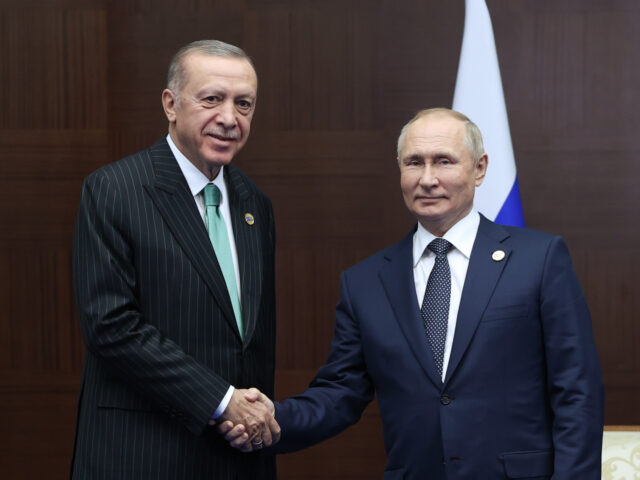Turkish President Recep Tayyip Erdoğan announced that he has come to a deal with Russian President Vladimir Putin to make his country a natural gas hub for Russian energy to be transported to Europe, giving Turkey more leverage over the energy-strapped EU.
Quoting Vladimir Putin, Turkish leader Recep Erdoğan said on Wednesday that “Europe can get its natural gas from Turkey,” after he came to an agreement to become a hub for Russian natural gas.
“In our last meeting, we agreed with Putin on this issue. We will create a hub here with Turkish gas coming from Russia,” Erdoğan said in a statement from Ankara.
The announcement of the deal followed a summit last week in Kazakhstan in which the two leaders held behind the scenes bilateral negotiations. Putin has said that amid disruptions to service to the Nord Stream 1 pipeline following what is believed to have been an explosion and an act of sabotage last month, Russia should consider exporting more gas through the TurkStream pipeline under the Black Sea which opened in January of 2020.
“Turkey has turned out to be the most reliable route for deliveries today, even to Europe,” Putin said after the meeting.
Like the now scuppered Nord Stream 2 pipeline, the use of the TurkStream pipeline will allow the Russians to cut out Ukraine in shipping its gas towards Europe via Bulgaria. According to a report from Russian state-owned media, Sputnik News, Moscow has the capability of transporting some 31.5 billion cubic meters of gas per year through the Turkish pipeline.
Last week, the Kremlin said that it had arrested several people for allegedly plotting an attack on the TurkStream pipeline, with Putin pointing towards Ukrainians attempting to target Russian infrastructure following the truck bombing of the Kerch bridge that connects the Russian mainland to the Crimean Peninsula, which was illegally annexed by Moscow in 2014.
On Wednesday, Danish authorities announced that after preliminary investigations — from which Russia was barred from participating — they have determined that the cause of the damage to the Nord Stream 1 pipeline was an indeed an explosion after investigators determined that the specific deformities in the metal pointed toward a powerful blast as the culprit. It is still unclear who was behind the sabotage, however, both the United States and Russia have made thinly-veiled accusations against each other for being behind the attack.
Nevertheless, the pipeline was largely inactive since August after Russia claimed that it was in need of maintenance work, while others have claimed that the shut down was intended on punishing countries like Germany for levying sanctions on Moscow and supplying arms to Ukraine. Russian President Putin has offered to transport gas through the never opened Nord Stream 2 pipeline to Germany, yet the EU powerhouse has so far refused the offer.
Should Turkey become a major hub for Russian gas flowing into Europe, it would provide Erdoğan with another major bargaining chip in disputes with the European Union. Previously the Islamist Turkish leader has been accused of using the flow of illegal migration through his borders as a form of blackmail, demanding that the bloc pay Turkey to house alleged asylum seekers, as well as provide the country with visa-free travel into Europe for its citizens.
The issue of illegal migration through Turkey into Europe was once again brought into the spotlight last month, when tens of thousands of Syrian and other alleged asylum seekers amassed on the Greek border in what was dubbed the “Caravan of light“. Though the group has so far been prevented from entering into Europe, the Turkish government has a history of “opening the gates” of migration.
Even without allowing the caravan to cross into the EU, Greek authorities have claimed that tens of thousands have still crossed into their country via Turkey this year, despite Greeks preventing over 150,000 illegal entries since the start of the year.
The Turks and the Greeks have also been in a protracted dispute over Turkey’s insistence on the demilitarisation of a series of islands in the Aegean Sea, with Athens even hinting at a potential military conflict with its supposed NATO ally in Ankara over alleged violations of its airspace and ramped up rhetoric over the issue.
While the prospect of handing Erdoğan more power over Europe through control of the natural gas hub may be unappetising, the European Union may not be in a position to turn down the offer of increased gas flow as it faces the threat of blackouts and unrest over the burgeoning energy crisis this winter.
Follow Kurt Zindulka on Twitter here @KurtZindulka

COMMENTS
Please let us know if you're having issues with commenting.